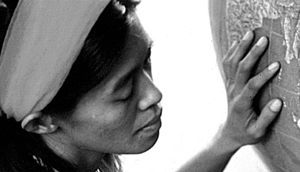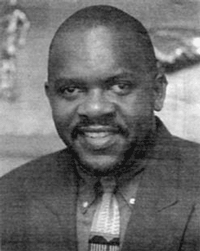
Breaking the glass ceiling
by Senator Floyd Morris
 |
Breaking the glass ceiling
by Senator Floyd Morris |
 © Pierre Virot, WHO |
The experiences cited in this article, highlight a long and hard struggle for social empowerment in a highly unfriendly disabled society. The experiences are not unique to me, but rather, reflect the struggles, discrimination, victimisation and resentment met by these individuals, upon climbing the ladder of upward mobility. The ability to succeed is determined by a willingness of the individual to adopt a tenacious and persevering approach to life. This has been my approach to confront the challenges of the society and break the glass ceiling. Life around the world is not an easy endeavour for the disabled, especially in developing countries. The upward mobility climb is often met with scorn, resentment, discrimination and victimisation. The trend in Jamaica is no different. In this article, I will highlight some of the difficulties and challenges individuals with a disability, have to encounter in Jamaican society whilst on upward mobility path. It is often said that the way a society treats its elderly and disabled is an indication of its level of development and civilisation. All societies should aspire to have mechanisms to take care of these vulnerable groups. In Jamaica, they are being put in place but we have a significant way still to go. All societies should facilitate the smooth rehabilitation and development of the talents of persons with a disability. No one with a disability should be made to struggle for assistance or rehabilitation. Wherever possible, the state and members of civil society should try to facilitate the smooth and orderly transformation of these persons’ lives. |
At the outset, both family and community members were skeptical of my ability to raise these chickens and to get the education that I dreamt about. But I managed to raise those chickens and generate sufficient funds to aid my schooling.
The next step was to move to an environment that was conducive to getting the education I wanted. A radio broadcaster to whom I am eternally grateful, Doraine Sammuels of RJR, advised me to come to the metropolitan area of Kingston which I did in 1991.
At first I stayed in Vineyard Town with my elder brother, Ralston, who gave me tremendous support during this trying time. The Jamaica Society for the Blind (JSB) offered rehabilitation support, and it was there that I learnt to read and write Braille. Simultaneously, I started evening classes in order to matriculate for the University of the West Indies.
One of the popular and affluent schools up-town blatantly refused to accept me in their programme, claiming that I was blind and therefore would not be able to keep pace with their students. But Mico Evening College accepted me and I sat seven subjects over a two-year period; two A’levels and five O-levels.
Two years living on that treacherous Marescaux Road had finally paid off. There were times when I tumbled into potholes, bumped into JPSCo’s light poles and wires, and even fell into the uncovered manholes that exist all over the streets of Kingston. However, such is life. My grandfather always told me, "If you want good, your nose have to run".
In 1993, I was accepted to the University of the West Indies (UWI) to read for the Bachelor of Arts degree in Mass Communication. This was a dream come true, as I wanted to become a radio broadcaster.
But my dream was threatened by the perennial problem of lack of financial resources. The Students Loan Bureau, to which I am currently repaying a loan, and a family friend who contributed $10,000, allowed me to grasp this opportunity of a university education. I decided to make the best use of this opportunity. It was an investment in my future and so I could not afford to fail.
I spent three wonderful years at UWI. Christine Cummings, Michael Witter, Aggrey Brown, Rupert Lewis, Marlene Hamilton, Peter O’Sullivan, Faye Ellington and many others, contributed significan-tly to my successful tenure at this illustrious institution.
I graduated with Honours in 1996, started the Master of Philosophy in Government degree at the same institution, studying the effects of the multi-lateral institutions on the political process in Jamaica. This programme was successfully comple-ted in January of this year.
Whilst at UWI, I was involved in several student activities including student politics. I became the first person with a disability to be elected to the Students’ Guild. I was elected after a hard-fought campaign in which I had to prove that I was just as competent and capable as my sighted opponents.
During the election debate, members of the campaign team decided to turn off the light just as I made the following statement, "all of us here have a disability. It’s just that some are more obvious than others. If I should turn off the light tonight, how many of you will be able to function? I would be able to because as a blind person, I can function under any circumstances, whether be it in darkness or in light." For over 15 minutes, the entire auditorium applauded the presentation. The next day I was successfully elected as deputy hall chairman for Taylor Hall. The years spent at university undoubtedly prepared me for things to come. The big break came in 1998, when for the first time in Jamaica, a blind person was appointed to parliament. The prime minister, the Hon. P.J. Patterson, was responsible for this.
My appointment came within the context of my involvement with the People’s National Party (PNP) Youth Organisation and the role that I played in the 1997 General Elections. I travelled the length and breadth of the country: from Morant Point to Negril Point and Clarendon to St. Mary, bringing PNP’s message to the people of Jamaica.
For this effort, the prime minister and president of the PNP decided to appoint me to the Senate. The appointment also came within the context of a genuine attempt on the part of the prime minister to broaden the levels of participation by the various social groups within the highest decision-making ins-titution of the country. The appointment was well received by a wide cross section of the Jamaican population, even though there were those who thought this historic act was one of tokenism.
The appointment to the Senate has given me the opportunity to speak on any issue relating to the Jamaican society although my advocacy has been confined to youth and the disabled. These are two groups that are amongst the most vulnerable within the society.
| Senator Floyd Morris is the first blind person appointed to the upper house in the Jamaican Parliament. A Master Degree graduate of the University of the West Indies, he has been instrumental in promoting a national policy on disability and contributes much of this time to motivational speaking in the nation’s schools. |
 |